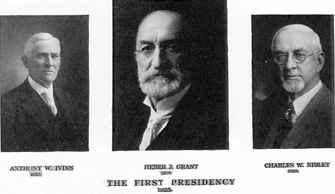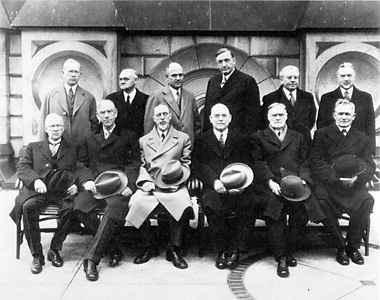
General Authorities |

First Presidency (1925-1931). Left to right: First counselor Anthony W. Ivins, President Heber J. Grant, and Second counselor Charles W. Nibley.
by Marvin K. Gardner
General Authorities are men called to serve at the highest levels of leadership in THE CHURCH of JESUS CHRIST of Latter-day Saints. As general priesthood officers of the Church, they have Churchwide rather than local stewardship and may receive assignments anywhere in the world. In order of precedence, the General Authorities include the First Presidency, Quorum of the Twelve Apostles, quorums of the seventy, and Presiding Bishopric (see Organization). First Presidency members and the senior member of the Quorum of the Twelve are addressed as "President." The Twelve Apostles and members of the quorums of the Seventy are addressed as "Elder." Members of the Presiding Bishopric are addressed as "Bishop." As a group, they are often referred to as "the Brethren."
Like all who serve in the Church, these men are lay leaders and do not solicit their assignments. They are "called of God, by prophecy, and by the laying on of hands by those who are in authority" (A of F 5; see Lay Participation and Leadership). They are called by a member of the First Presidency; subsequently, their names are presented to the Church membership for a sustaining vote each year during general conference and in ward and stake conferences.
Members of the First Presidency and Quorum of the Twelve are sustained as prophets, seers, and revelators. They are commissioned to be special witnesses of Jesus Christ and his Church, and together with the Seventy they are to bear witness of him and "to build up the church, and regulate all the affairs of the same in all nations" (D&C 107:21-26, 33-35).
As assigned, General Authorities may travel throughout the world to preach the gospel, train and instruct local leaders and members, preside at stake conferences, organize new stakes, call and set apart new stake presidencies, and generally look after the interests of the Church. They may also be called upon to address the Church membership at General Conference.
In addition, General Authorities fulfill administrative responsibilities at Church headquarters, directly overseeing the Church's efforts in such areas as missionary work, Church history, family history (genealogy), temple worship, priesthood, finances and record keeping, curriculum, public communications, and the building program. Some serve on the Church Board of Education, overseeing the Church Educational System and sitting on boards of trustees for Church-owned colleges and Brigham Young University.
General Authorities, particularly members of the quorums of the Seventy, may be assigned to live away from Church headquarters for a time and serve in area presidencies, presiding over regions and stakes in those areas. Occasionally some are called as mission presidents or temple presidents, although non-General Authorities most often serve in these positions.
Wives and children of General Authorities may be called to serve in regular Church assignments in their home wards and stakes. Wives of General Authorities who are serving in area presidencies may be called to assist with auxiliary organizations such as the primary, young women, and Relief Society in the countries where their husbands are serving. General Authorities themselves are not called to serve in the local organizations.
The general presidencies and boards of the Church's auxiliary organizations are sustained as general officers of the Church, but they are not General Authorities. They are set apart for a time as general officers for their specific auxiliary organization.
Unlike local leaders, who maintain their normal vocations while serving in Church assignments, General Authorities set aside their careers to devote their full time to the ministry of their office. The living allowance given General Authorities rarely if ever equals the earnings they sacrifice to serve full-time in the Church.
Members of the First Presidency and Quorum of the Twelve serve for life. Other General Authorities serve either until limited by age or health or for temporary periods. They may be released or receive emeritus status. After their service they return to ward and stake responsibilities.
Calls from one group to another are possible. For example, any General Authority may be called to serve in the First Presidency or Quorum of the Twelve, although previous service as a General Authority is not a prerequisite for these positions. Men from many nations have been called to serve as General Authorities.
Life as a General Authority demands great sacrifices of time and energy. It requires heavy involvement in decision making and continual travel away from home and family. But the work is rewarding. "I have witnessed the miracles that come with faith," said President Gordon B. Hinckley when serving as Second Counselor in the First Presidency. "I have seen the evidences of true goodness and greatness in men and women living under a great variety of circumstances. I have observed in a very intimate and wonderful way the workings of the power of the Almighty among his children" (p. 7).
There is striking unity among the General Authorities, which is at least partly due to decision making by common consent. "The General Authorities are all individuals, each with his own personality," said President Hinckley. "Each brings to his responsibilities a wide variety of experience and background. When matters come up for discussion in the leading councils of the Church, each is free to express his views. As one observes that interesting process at work, it is fascinating to witness the power of the Holy Spirit influence these men. Initial differences, never sharp but nonetheless perceptible, soften and meld into an expression of unity" (p. 6).
Although they have general administrative authority and are entitled to inspiration regarding the governing of Church affairs, General Authorities respect the right each member of the Church has to receive personal revelation. The Lord told Joseph Smith that the gospel was restored so "that every man [and woman] might speak in the name of God" (D&C 1:20).
General Authorities are men who, through years of experience in Church service, have proven to be faithful, effective, and devoted leaders and servants. As witnesses of the Lord and as general officers of the Church, they are trusted, loved, and respected throughout the Church.
[See also Following the Brethren; Basic Beliefs home page; Church Organization and Priesthood Authority home page; Priesthood Organization home page]
Illustrations

General Authorities hold general authority over the church. Quorum of the Twelve Apostles (1921-1931): Seated (left to right): Rudger Clawson, Reed Smoot, George Albert Smith, George Franklin Richards, Orson F. Whitney, David O. McKay. Standing (left to right): Joseph Fielding Smith, James E. Talmage, Stephen L. Richards, Richard R. Lyman, Melvin J. Ballard, John A. Widtsoe.
Bibliography
Arrington, Leonard J., ed. The Presidents of the Church: Biographical Essays. Salt Lake City, 1986.
Flake, Lawrence R. Mighty Men of Zion: General Authorities of the Last Dispensation. Salt Lake City, 1974.
Hinckley, Gordon B. "He Slumbers Not, nor Sleeps." Ensign (May 1983):5-8.
Presidents of the Church: "They That Move the Cause of Zion." Salt Lake City, 1979.
Tanner, N. Eldon. "The Administration of the Church." Ensign 9 (Nov. 1979):42-48.
Updated information on newly called General Authorities is available in the Deseret News Church Almanac, published biennially.
Encyclopedia of Mormonism, Vol. 2, General Authorities
Copyright © 1992 by Macmillan Publishing Company
All About Mormons |